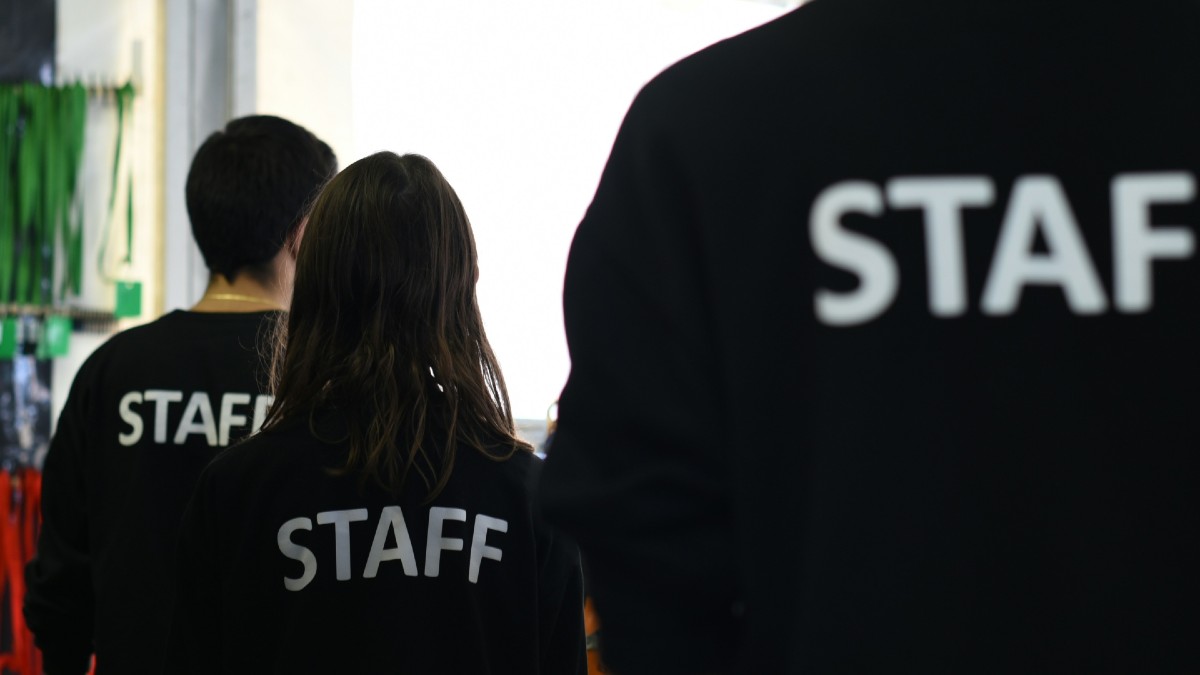
Written by: Cara Tirona
April 2, 2025
Managing multiple events simultaneously can feel like a juggling act, especially when each event has unique requirements, deadlines, and stakeholders. However, with the right strategies, tools, and a clear plan, you can coordinate multiple events efficiently and without overwhelming stress. Here’s your guide to mastering multi-event management with confidence.
Table of Contents
- Why Coordinating Multiple Events Requires a Unique Approach
- Effective Strategies for Managing Simultaneous Events
- Develop a Comprehensive Timeline
- Delegate Responsibilities Wisely
- Maintain Clear Communication
- Utilise Technology for Seamless Communication
- Create a Comprehensive Information Repository
- Encourage Feedback and Adaptability
- Foster Team Collaboration
- Set Clear Roles and Responsibilities
- Specify Task Assignments
- Automate Where Possible and Centralise Your Data
- Time Management Tips for Event Planners
- Conclusion: Simplify Multi-Event Planning with VenueNow
Why Coordinating Multiple Events Requires a Unique Approach
When it comes to event planning, no two events are exactly alike. Each event may cater to different audiences, have distinct themes, or necessitate varying resources and logistics. This diversity can complicate the planning process, making it essential to adopt a tailored approach. Here are some key reasons why coordinating multiple events requires a unique strategy:
Different Objectives and Audiences
Each event serves a different purpose, which significantly influences how you approach planning. For instance, a corporate conference may aim to foster networking and professional development, while a community festival may focus on celebrating local culture and providing entertainment. Understanding the specific objectives of each event allows you to tailor the content, marketing strategies, and activities accordingly. Additionally, the target audience differs from event to event. Aimed at potential clients, industry professionals, or local families, the vibe and message will need adjusting to resonate with those distinct groups effectively.
Overlapping Timelines
Coordinating multiple events often means dealing with overlapping timelines, which can add pressure to your planning process. Different events come with their own schedules for planning, marketing, and execution. If not managed carefully, this can lead to missed deadlines, confusion among team members, and increased stress levels.

Managing Limited Resources
When orchestrating several events, it’s likely that you’ll be working with a shared pool of resources—budget, personnel, venues, and even time. This scarcity can complicate the planning process and necessitate strategic prioritisation. Effective resource allocation is paramount when managing multiple events. You will need to identify and prioritise the key resources for each event, ensuring that each receives what is necessary for success. A resource allocation matrix can provide clarity by detailing which resources are assigned to which events, helping to avoid conflicts and ensure all needs are met.
Effective Strategies for Managing Simultaneous Events
Managing multiple events simultaneously can be a daunting task, but with the right strategies in place, it can also be a rewarding experience. Successfully juggling several events requires meticulous planning, excellent organisation, and flexibility to adapt to shifting circumstances. Below are effective strategies that can help streamline the process and ensure that every event runs smoothly.
Develop a Comprehensive Timeline
Creating a detailed timeline is critical for successfully managing overlapping events. Map out each phase of the planning process for all events, including critical deadlines like venue bookings, vendor confirmations, and marketing pushes. Utilising project management tools can streamline this process. Tools like Gantt charts or Kanban boards provide visual representations of where each event stands on your timeline, helping you to spot potential clashes or delays early. Setting milestones for each event keeps the team focused and accountable as they progress.
Delegate Responsibilities Wisely
When handling multiple events, effective delegation is essential. Assign specific roles and responsibilities to team members based on their strengths and expertise. By dividing tasks such as vendor management, site visits, and marketing, you can ensure that no one person is overwhelmed and that each task receives the attention it deserves. Regular updates and check-ins can facilitate communication and provide opportunities to adjust responsibilities if an event requires additional attention.

Maintain Clear Communication
Clear and consistent communication is crucial when managing simultaneous events. Establish a centralised communication platform where all team members can access information, updates, and resources. Encourage open dialogue and set regular meetings to review progress, address concerns, and brainstorm solutions to challenges as they arise. This transparency helps to keep everyone aligned on objectives and fosters a collaborative environment. Consider using group chat applications or project management software that include functionalities like shared calendars and file storage to enhance collaboration.
Utilise Technology for Seamless Communication
In today's digital age, leveraging technology can greatly improve communication efficiency. Tools such as Slack, Microsoft Teams, or Asana can facilitate real-time messaging and document sharing, making it easier for team members to stay connected regardless of their physical location. Video conferencing software such as Zoom or Google Meet can also be invaluable for holding face-to-face check-ins, especially when dealing with multiple events that may have teams spread across different locations.
Create a Comprehensive Information Repository
To prevent miscommunication and ensure that everyone has access to the information they need, develop a centralised repository that houses all event-related documents, such as timelines, checklists, and FAQs. This could be a shared drive or a dedicated space in a project management tool. By ensuring that all team members can easily find the information they need, you reduce the risk of misunderstandings and keep everyone on the same page.
Encourage Feedback and Adaptability
Encourage team members to share their thoughts and feedback on communication strategies. Assess what works well and where improvements can be made. Be open to adjusting communication styles or channels based on the needs of the team. Hosting regular debriefing sessions can provide an opportunity for team members to reflect on what went well during the events, what challenges they encountered, and how communication processes can be refined for future endeavours. Emphasising a culture of continuous improvement not only enhances the current coordination efforts but also contributes to a more effective team dynamic in the long term.
Foster Team Collaboration
In addition to encouraging feedback, it's essential to create a culture that values collaboration. This can be fostered through team-building activities that strengthen relationships and improve interpersonal dynamics. Activities can range from informal gatherings to structured workshops aimed at enhancing teamwork skills. The goal is to create an environment where team members feel comfortable sharing ideas and leveraging each other's strengths, which can significantly improve the execution of multiple events.

Set Clear Roles and Responsibilities
To effectively coordinate multiple events, it's crucial to establish clear roles and responsibilities within the team. When everyone knows their specific duties, it reduces confusion and ensures that critical tasks are completed on time. Furthermore, defining roles helps in accountability; team members can take ownership of their tasks, empowering them to perform at their best.
Specify Task Assignments
Begin by identifying all critical aspects of the event planning process, such as venue selection, catering, marketing, and logistics. Once these tasks are outlined, assign them to specific team members based on their strengths and expertise. This targeted approach not only empowers individuals by allowing them to take ownership of their responsibilities but also fosters accountability within the team. Maintaining a visible chart or project management tool displaying each person's tasks can aid in tracking progress and ensuring that everyone is aligned with their responsibilities.
Automate Where Possible and Centralise Your Data
In today’s fast-paced environment, automation can be a game changer for event planning, especially when coordinating multiple events simultaneously. Utilising technology to streamline various processes allows teams to focus more on creativity and execution rather than getting bogged down by repetitive tasks.
Centralising your data is essential for effective event planning, particularly when managing multiple events. By consolidating all relevant information into a single, accessible platform, you promote efficiency and reduce the likelihood of miscommunication or errors.
Time Management Tips for Event Planners
Managing time effectively is one of the biggest challenges faced by event planners, especially when juggling several events at once. Proper time management not only ensures that all tasks are completed on time but also allows for flexibility and spares you from last-minute crises. Here are some essential time management tips to help you stay organised and reduce stress.
Prioritise Tasks Effectively
One of the most significant challenges in event planning is juggling multiple tasks simultaneously. To manage your time effectively, prioritise tasks based on deadlines and importance. Use the Eisenhower Matrix to distinguish between what is urgent and what is important. By doing so, you can focus your energy on tasks that will have the most significant impact on the success of your events.

Create a Detailed Timeline
Developing a timeline for each event can significantly enhance your time management efforts. Break down the planning process into phases and establish clear milestones for each phase. Assign specific due dates for tasks, ensuring that you are allowing ample time for each aspect of the event. Regularly review this timeline with your team to track progress and make necessary adjustments.
Utilise Project Management Tools
Project management software can be invaluable when coordinating several events. Tools like Trello, Asana, or Monday.com provide boards or lists that can help you visualise the progress of each task. These tools allow you to set deadlines, assign tasks, and, when necessary, communicate with your team, ensuring everyone stays on the same page. Make it a habit to check in regularly on these platforms to stay informed and proactive.
Schedule Regular Check-Ins
Frequent team check-ins are essential for maintaining cohesion and momentum during the planning of multiple events. These meetings provide an opportunity for team members to update one another on their progress, discuss any challenges they’re facing, and brainstorm collaborative solutions.
Avoid Overcommitting
One of the most significant pitfalls in event planning is the tendency to take on too much at once. When managing multiple events, it is crucial to recognise your limits and those of your team. Overcommitting can lead to burnout, diminished quality of work, and ultimately, the failure of an event to meet expectations.
Set Realistic Goals
In order to avoid overcommitting, it is essential to establish realistic goals for the number and scope of events you plan to coordinate. Assess your team's capacity, experience, and available resources before committing to any new projects. By understanding what can realistically be achieved within a given timeframe, you can allocate your efforts more effectively and maintain a sustainable workload.

Break Goals into Manageable Steps
Once you have established the overarching goals for your events, break them down into manageable steps or tasks. This not only makes complex objectives less intimidating but also allows you to celebrate small victories along the way. For instance, if your goal is to organise a large gala, consider dividing it into components such as venue selection, catering arrangements, and entertainment bookings. Assign these smaller tasks to different team members, facilitating a collaborative and focused approach to achieving the larger goal.
Stay Ahead of Deadlines
Staying ahead of deadlines is crucial when coordinating multiple events simultaneously. Having a proactive approach can significantly alleviate stress and lead to a more successful outcome. To effectively stay ahead of deadlines, implement a robust project management system that allows you to track progress, assign tasks, and set timelines. Utilise tools like Gantt charts or project management software to visualise the different stages of each event. This transparency helps everyone involved to see the big picture and prioritise their work appropriately.
Conclusion: Simplify Multi-Event Planning with VenueNow
Coordinating multiple events requires a structured approach, clear communication, and the right tools. By implementing these tips, you can ensure your events run smoothly and leave lasting impressions.
Ready to simplify your venue search? With VenueNow’s advanced search filters and free venue-finding service, finding the perfect venue for each event has never been easier. Let us help you take the stress out of multi-event planning.
Explore venues on VenueNow today and make your next event unforgettable!
Looking for an event venue to hire?
VenueNow has you covered with over 2,000 venues across Australia ranging from large event spaces to small meeting rooms. Find your perfect venue for hire faster than anywhere else.
Follow us on social media to stay up to date with the latest news
Customers
Want to get in contact?
Call our support team on 1300 647 488 during business hours AEST.
Follow Us
© Copyright VenueNow 2026 | SPARE GROUP PTY LTD | ABN 22 607 830 302











